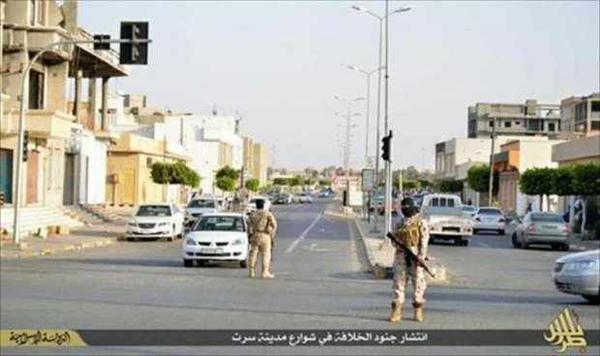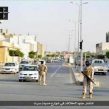
BRIEFS
Publication: Terrorism Monitor Volume: 13 Issue: 17
By:

LIBYA FACES DEEPENING CHAOS
James Brandon
Overshadowed by events in Syria, Yemen and elsewhere in the Middle East, Libya has slipped deeper into chaos in recent weeks. This trend was accentuated in mid-August when the Islamic State in Libya, a group that has pledged allegiance to the Syria and Iraq-based Islamic State organization, made fresh territorial gains in and around the central coastal city of Sirte, having previously taken control of much of the city in June. The fighting in Sirte reportedly began after the Islamic State branch assassinated a prominent imam, Khalid bin Rajab Ferjani, who was from the local al-Farjan tribe, a substantial force in many of Libya’s central coastal cities. Although the al-Farjan tribe has traditionally been strongly represented in the region’s Sufi orders, the assassination came after local Salafists and al-Farjan tribesmen had refused to pledge allegiance to the Islamic State (Libya Herald, August 16).
Significantly, one of the Islamic State foreign fighters killed in the fighting in Sirte is reported to have been Abdullah Abu Zaid Mohamed Hamza, whose father, Abu Zaid Mohamed Hamza, and other relatives, were prominent Sudanese militant Salafists (Libya Herald, August 17). Abdullah’s involvement in the Sirte fighting shows both that Libya continues to attract foreign fighters, particularly from elsewhere in Africa, and that some fighters have decades-old family linkages to radicalism. Medical sources in the town were separately reported as saying that Islamic State fighters only allowed doctors to treat their own injured (ANSA, August 17). The bodies of 12 tribal fighters were later put on public display in the city by the group, which then prohibited their relatives from giving them Muslim burials, on the grounds that by resisting the Islamic State, they had become infidels (Libya Herald, August 16). The group was also reported to have executed a suspected “spy” in the eastern city of Derna (Libya Herald, August 17). Although the Islamic State in Libya may only be linked tenuously to the Iraq and Syria-based Islamic State group, its tactics—which include the targeting of rival and more moderate religious leaders, their treatment of their enemies as non-Muslims and their calculated use of atrocities to instill fear in their enemies—nonetheless indicate the close ideological links between the two organizations.
In response to the Islamic State in Libya’s latest gains in Sirte, the country’s internationally-recognized government, which is based in the eastern city of Tobruk, called for Arab countries to carry out airstrikes against the group, saying that it was itself “unable to ward off these terrorist groups because of the arms embargo” (France24, August 17). The Organisation of Islamic Cooperation, the main pan-Islamic global body, however, merely issued a statement expressing “strong condemnation” of the Islamic State attacks, underlining that many Arab countries remain too overstretched by their own internal problems, or with other situations such as Syria, to offer much effective action on Libya (KUNA, August 17). Egypt, meanwhile, reported the disappearance of an unspecified number of Egyptian soldiers in the vicinity of the Libyan border, raising the possibility that extremists in Libya may be testing Egyptian defenses in the area, perhaps with a view to carrying out raids deeper into Egypt (al-Ahram, August 17).
Meanwhile, Libya’s various governments—seemingly unaware that the country has collapsed around them—have continued to pump out bizarre and out-of-touch announcements. The Tripoli-based government, despite being desperately short of money, declared on August 16, that the city’s destroyed airport would be rebuilt, a project which would cost many millions of dollars; just the previous week, the Tobruk-based government had unilaterally announced that the airport would be renamed after the country’s former monarch, King Idris (Tripoli, August 16). The internationally-recognized government in Tobruk also announced the appointment of the head of the state oil firm, ignoring the fact that the oil ministry and associated bureaucracy remain based in Tripoli and firmly under the control of its rivals (Reuters, August 15). The continuing divisions between these governments are both a cause and a consequence of the rise of the Islamic State’s local variant, reflecting that the Libya has effectively ceased to exist as a functional state and also underlining the difficulties involved in tackling extremist groups in the country.
AUSTRALIAN ARRESTS UNDERLINE CONTINUING BATTLE AGAINST ISLAMIC STATE
James Brandon
Australian Prime Minister Tony Abbott, on August 20, confirmed that seven suspected Australian would-be jihadists had been arrested earlier in the month at Sydney airport while trying to travel to the Middle East (The Australian, August 20). Abbott, not known for mincing his words on Islamist radical groups, said the arrests showed “the continuing allure of this death cult,” a reference to the Iraq- and Syria-based Islamic State organization. While indeed underlining the continuing appeal of the organization to a minority of Australian Muslims, the arrests also underline that the Australian authorities appear highly vigilant to the threat posed by the Islamic State and are quick to take a range of actions, both conventional and unconventional, against suspected fighters or supporters of the group.
Particularly noteworthy are the Australian authorities’ effort to encourage individuals known to have been involved with jihadist groups in Syria and Iraq to willingly return to Australia in order to face trial. For instance, in July, the Australian Federal Police negotiated the voluntary return of Adam Brookman, a 39-year-old nurse and convert to Islam from Melbourne, to Australia from Turkey (AAP, July 26). Brookman has claimed that he was forced to work as a nurse for the Islamic State in their capital Raqqa after initially entering Syria to perform humanitarian work. He was arrested upon his arrival in Australia and is currently awaiting trial. Another Australian convert, 18-year-old Oliver Bridgeman, is also reported to be trying to negotiate his return to Australia, having apparently joined Jabhat al-Nusra, al-Qaeda’s official affiliate in Syria (Courier Mail, May 21; ABC, May 16). In response to Brookman’s return, the Australian Federal Police’s manager of counter-terrorism operations, Commander Peter Crozier, told the media that he was “hopeful” that other Australian jihadists would also return home, although he said that they would nonetheless face penalties: “If people think they are just going to walk through the front door and nothing is going to happen, then that is unfair and it is being naive” (Courier Mail, May 21). Australia’s approach in this regard is almost unprecedented among Western countries and will be being watched closely by other governments, which are also struggling to find a way to balance the need to punish appropriately jihadists while also recognizing the need to help individuals seeking to exit jihadist groups, as they could pose a greater threat if they remain with these organizations.
At the same time, however, the Australian government is also pursuing a range of more conventional measures against known jihadist supporters. For instance, in August, the government imposed financial sanctions against Mostafa Farag (a.k.a. Abu Sulayman al-Muhajir), a former Sydney cleric who is one of the country’s most prominent jihadists presently active in Syria (The Australian, August 20). Farag, who travelled to Syria in 2011 is now in the shura (leadership committee) of Jabhat al-Nusra. Focusing Australian governmental attention is the risk of returning radicals, or individuals inspired by the group, carrying out attacks domestically. Underlining this potential threat, a recent Islamic State “hit list” circulated online by a number of radicals, including prominent Australian Islamic State member Neil Prakash, formerly of Melbourne, that featured at least 11 Australians, including politicians and government employees (ABC, August 13; Herald Sun, August 13). Although this particular threat does not appear to be backed by any concrete plans to conduct attacks in Australia, Prakash is one of the Islamic State’s most successful Australian online influencers, with a track record of attracting would-be recruits initially through public social media outlets and then radicalizing them further in private forums (Herald Sun, August 19). In December 2014, a lone Muslim radical, who was apparently partly-inspired by the Islamic State, took 18 hostages in a cafe in downtown Sydney; two of the hostages—and the perpetrator—were killed when police stormed the store, and the potential for such attacks clearly remains (The Australian, December 30, 2014).





